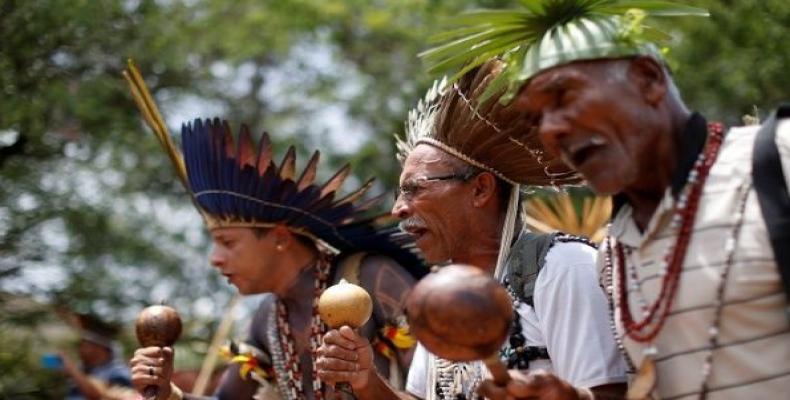Brasilia, January 14 (RHC)-- The Association of Indigenous Peoples of Brazil (APIB) have launched a world campaign of solidarity against the ‘ethnocidal’ policy of President Jair Bolsonaro, which is threatening their territories and lifestyles.
“We ask for the support of all the international community, of people involved in human rights, that can help to block this measure to hand FUNAI over to the evangelical, to the ruralists, and cause a real massacre, an ethnocide in the Indigenous territories of Brazil,” says Karai Popygua, a Guarani leader at the Jaragua Indigenous territory.
“With this move, we know that the FUNAI will be emptied and it won’t fulfill its constitutional function, which is to defend our right to our territories.”
One of Bolsonaro’s main strategies was stripping the National Foundation of the Indigenous (FUNAI) of its responsibilities in order to allow mining, logging and large agriculture projects into protected territories. To do so, he put the organization under the command of the Ministry of Women, Family and Human Rights, led by the controversial Damares Alves.
“Alves is a person who has historically persecuted the Indigenous peoples, who preaches religious fundamentalism, hoping to impose the Christian religion on the Indigenous peoples of Brazil,” Popygua continued.
Chirley Pankara, Indigenous Pankara lawmaker, says that Alves doesn’t represent the Indigenous peoples: “A representative who wants to evangelize Indigenous peoples is very outside of the context of the reality of Indigenous peoples.
"Spirituality is our strength. We have 305 Indigenous peoples in the country, with their cultural and spiritual diversity. Let’s respect the culture of the Brazilian people and let’s respect the original people of Brazil. Let’s not invade the houses of people who have their own customs, values and realities."
The FUNAI was in charge of identifying, demarcating and recognizing Indigenous territory, protecting it from external economic ventures according to Indigenous autonomy rights, even verifying if uncontacted groups were still present in some parts of the Amazon rainforest.
Now, those duties have been delegated to the Ministry of Agriculture, headed by a person accused of lobbying in favor of large-scale agriculture and logging companies.
Such a decision sparked protests from several Indigenous and environmental organizations, arguing that the future of the world’s largest rainforest is at stake.
The organization says the new measures will end up with Constitutional conquest earned after decades of struggle by the Indigenous movements and warns against Bolsonaro’s integrationist model based on the military regime.
Ara Mirim, also a Guarani leader from Jaragua, calls for the government to understand that Indigenous people protect the forests they live in. “The greatest rate of forested areas are where there are Indigenous populations," Misim said. "The rivers clean, the forests preserved.
“The government really needs to see in another way who are these peoples who are here, respect every people that lives in this country, they way they live, the traditional way of each people."
APIB argues the government’s strategy is to expel Indigenous people from their own territory and forcibly incorporate them into the urban and rural work force, according to the principles of neo-liberalism.
There are currently about 900,000 Indigenous people living in Brazil occupying 12.2 percent of the national territory, mostly in the Amazon rainforest. With a total population over 200 million in Brazil, the Indigenous people represent only a small part, and according to Bolsonaro, they use too much space and bring little to the country.
Under that logic, the far-right president wants to “integrate” the Indigenous people and keep them from “obstructing development” in Brazil. “The environmental license obstructs majors, governors and the president," said Bolsonaro in a video posted on social media last month.
"If you want to build a road, you can’t. That happens a lot in the Amazon region. We will end with this so the environmental policy is no longer an obstacle in Brazil."
Sonia Guajajara, one of APIB’s leaders and former vice-presidential candidate for the Socialism and Liberty Party, called on the European Union in early December to impose trade sanctions on Brazil to avoid an ecological disaster and potential genocide of Indigenous population.
Brazil's Indigenous launch global campaign against Bolsonaro

Related Articles
Commentaries
MAKE A COMMENT
All fields requiredMore Views
- Cuba Salud 2025 will ratify the Cuban Revolution's achievements in health care
- Children from the capital dominated taekwondo in the Pioneer Cups
- U.S. revokes visa of Colombian President Gustavo Petro
- Israel secures 6-month delay in Gaza genocide case at International Court of Justice
- President Díaz-Canel inaugurates Cuba Salud 2025: A convention for universal well-being

